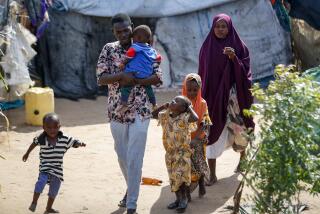‘Kinsmen’ With Aid Meet Kurds Fleeing Iraq
- Share via
CUKURCA, Turkey — Even the limping donkeys looked exhausted Saturday as the epic dimensions of the Kurdish exodus from northern Iraq came into view, an apparently unending stream of tens of thousands of refugees trudging wearily through Turkey to their next holding area.
But as the Kurds were being moved Saturday from a hazardous camp in Turkey back into Iraq, hundreds of Turkish Kurds converged with food, shoes and other supplies for the ragged refugees.
“It’s our duty as human beings,” said Osman Atan, a Turk who had brought several truckloads of food from a town three hours’ drive away. “They are also Kurds, our kinsmen.”
The Iraqi Kurds were being moved from the Uzumlu camp on the Turkish side of the border several miles west of Cukurca. Refugees said hundreds of children and old people at Uzumlu died of cold, hunger and even mine blasts as they went to collect firewood.
Turkey said Saturday that 1,500 of the 280,000 refugees who have gathered on its border over the past week have died of exposure, hunger, lack of food and wounds from battles inside Iraq. Their trials are far from over.
The Uzumlu refugees’ hopes that they might be allowed to stay in Turkey or even go abroad were dashed as cattle trucks slowly drove them to a campsite being set up by Turkish troops just across the border, inside Iraq.
But, although the refugees have not escaped from Iraq, at least aid is more accessible. Trucks carrying supplies can reach the new camp, which Turkey hopes will accommodate the 100,000 people it says are on the eastern half of its 200-mile border with Iraq.
The refugees tramping from the Uzumlu camp were met by hundreds of Turkish Kurds bringing them bread, new rubber shoes and cans of food. Some, including old men and boys, had been shuttling on the grueling four-hour trek from the main road to the camp for more than 24 hours.
Trucks carrying food came from all over southeastern Turkey, all manned by volunteers. They appear to be the main source of help for the refugees; there is little sign yet of international relief aid in the Cukurca area.
The refugees from the Uzumlu camp are virtually all from one Iraqi town, Dahuk, about 40 miles southwest of this Turkish border town. Most are Kurds, but they include a cross-section of its people--Iraqi army deserters, Assyrian Christians and even the imam of the Dahuk town mosque, Ali Nabi Salih.
“We left because we saw it was finished, there was no food, everything was destroyed. There was no reason to live in Dahuk anymore,” Salih said.
Salih wore a soiled blue cape that showed the effects of the hardships suffered by most of his people, a four-day walk from Dahuk and three days with virtually no food and no shelter, sleeping on the ground in Uzumlu. He said he had said prayers for more than 100 people dying each day, mostly children under 7 years old.
Salih referred bitterly to the news that the United States and Britain would begin airdrops of supplies in northern Iraq. He acknowledged that the refugees badly need the tents that are expected to be airdropped, and that Kurdish guerrillas who may still be fighting in northern Iraq also need them.
“Bush encouraged Saddam to make this disaster,” Salih said. “The morale of the Iraqi army was zero, but once Bush’s position encouraged them, their morale started to rise. The army may have been weak, but it was strong enough to crush the rebellion.”
Some women were picking their way down the rocky slopes Saturday in nightgowns hastily donned during the shelling of Dahuk 10 days ago. Others were dressed in traditional, brightly colored Kurdish clothes, some with rows of flashing sequins.
One blind woman rode a mule. A mother pushed a muddy baby carriage. Young boys led limping grandmothers. Perhaps most pitiable were the children, with their clothes filthy, their shoes tied together with string, many simply going barefoot.
Some played cheerfully in the sun, but the constant sound of the long procession was the crying of babies. All the mothers said their children were suffering from diarrhea, coughing and exhaustion.
“When we left we didn’t even take any food. We could only take our children,” said Ahmed Said, carrying his ailing 10-year-old son, Dindar, on his back, smiling but wearing a look of defeat.
“Our town of Dahuk is now empty,” said Mofsan Sali Nabih, a theology student. “We thought we could surround Baghdad with the Shiites in the south and the Kurds in the north. If Bush had given us 48 more hours, we would have finished him (Saddam Hussein). But now they’ve burned and robbed everything in the town. We can only go back if Saddam is killed.”
More to Read
Sign up for Essential California
The most important California stories and recommendations in your inbox every morning.
You may occasionally receive promotional content from the Los Angeles Times.













